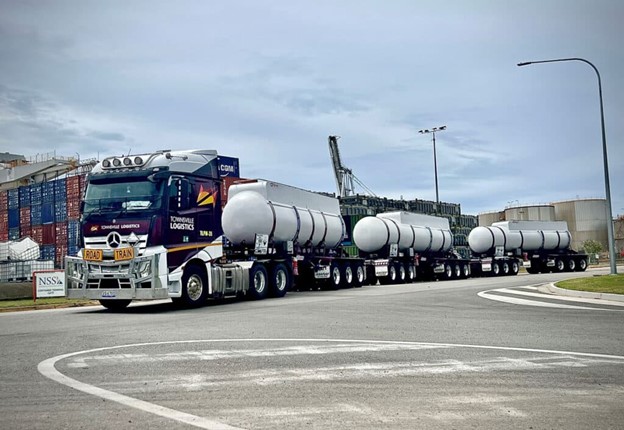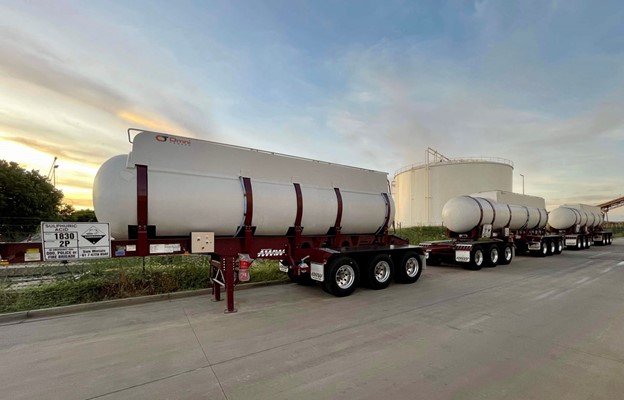Storage/Loading/Unloading - Transportation
August 1,
2023
Lightweight triple road train tankers
a world first
Three triple road train sets have now been delivered to Townsville
Logistics for use in heavy acid transport across northern Australia.

Townsville Logistics, along with Sun Metals Corporation, is a
local subsidiary of South Korea’s Korea Zinc, the world’s largest base
metals producer.
Sun Metals has set ambitious decarbonisation targets across the
organisation, including a goal of being the first in the world to
produce “green zinc”.
It aims to be 100 per cent renewable energy-powered by 2040 at its
Townsville site, where it makes high-grade zinc metals, as well as
secondary products including sulfuric acid and copper cake.
The new triples are helping to reduce operational costs, with
their greater payload capacity meaning fewer trips.
Employing advanced composite materials and engineering practices
commonly found in aerospace, Omni Tanker’s new triple tanker features
world-first “Mould-in-Baffles” to better manage the movement of fluid
(surge) in the road tankers, in order to enhance safety, while advanced
fabrication techniques also reduce the weight of the trailer units.
The Omni Tanks used on the triple road trains were required to
contain baffles inside, as a safety feature to mitigate sloshing of
fluids, and to meet dangerous goods transport tank regulation
requirements.
Omni Tanker says the Mould-in-Baffle principle has been five years in
the making and is now an important part of its portfolio, with the
technology set to enter service in the Australian market, as well as
export markets including North America and Europe.
The Mould-in-Baffles developed for these tanks are highly
specialised and unique to Omni Tanks. Based on a moulding process that
produces the internal baffle at the same time as the lining of the tank,
there are no seams or joins associated with the baffle joining the tank
wall. As a result, the interior lining of the tank is weld free – a
major enabling feature for the triple road train.This
collaborative project between Omni Tanker and Mick Murray Welding has
delivered a triple road train solution that boasts a 15 per cent gain in
payload – as a result of the advanced carbon fibre composite
construction – enabling a reduction in the number of trips and
associated emissions.
CEO and founder of Omni Tanker, Daniel Rodgers, said, “Omni Tanker
is combining advanced manufacturing technology with aerospace materials
and heavy-duty trailers to deliver game-changing liquid payloads for the
critical minerals processing industry – right here in Australia.”He
continued, “Mick Murray Welding was crucial in achieving project success
for our first product in the mining sector. They knew what the
mining industry demanded, and they knew the harsh operating conditions
they operate in, so it made absolute sense to combine Omni Tanker’s
lightweight tanks with their high-tensile steel-skeletal trailers.“Via
advanced manufacturing techniques and outstanding partners, we were able
to boost the payload carrying capacity of road tankers for chemical
liquids from the current 85 tonnes per load, typical of stainless-steel
tanks, to 98 tonnes – a 15 per cent uplift.”
Type approval of the new Mould-in-Baffle structures has now been
granted, with unit builds completed for Australian road trains in late
2022, followed by first type approval for European Swap Tanks under the
European ADR (Road) and RID (Rail) in early 2023.

![]()

